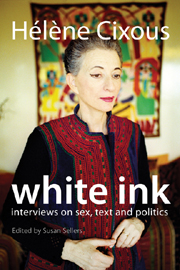Book contents
- Frontmatter
- Contents
- Acknowledgements
- Editor's note
- Preface: On being interviewed
- Part I Writing the enigma
- Part II Writing the feminine
- Part III Writing and politics
- 7 Guardian of language
- 8 Against the emotion of history
- Part IV Writing and theatre
- Part V Writing roots
- Part VI On painting, music and nature
- Part VII Dialogues
- Envoi: But the Earth still turns, and not as badly as all that
- Bibliography of Hélène Cixous's works
- Index
8 - Against the emotion of history
from Part III - Writing and politics
- Frontmatter
- Contents
- Acknowledgements
- Editor's note
- Preface: On being interviewed
- Part I Writing the enigma
- Part II Writing the feminine
- Part III Writing and politics
- 7 Guardian of language
- 8 Against the emotion of history
- Part IV Writing and theatre
- Part V Writing roots
- Part VI On painting, music and nature
- Part VII Dialogues
- Envoi: But the Earth still turns, and not as badly as all that
- Bibliography of Hélène Cixous's works
- Index
Summary
This interview originally appeared as “Les Motions contre l'émotion de l'histoire”, in Politis (7 July), 46–8, 1988.
dl Why have so many writers this century been seduced by the call to political action and the temptation of power?
cixous Action and power are two different things. Who are you thinking of?
dl Of André Malraux, for example. Jawaharlal Nehru, on meeting him again, exclaimed, “So now you're a minister!” The fascination with power has never been without consequences …
cixous Far be it from me to speak of Malraux. Perhaps, towards the end of his life, he wished to tread the boards of a stage which he thought had been transformed. If a writer is drawn to power it is because he is not, or is no longer, in love with writing. The only thing left to do is to become a minister. Poetry and power are estranged nations: it is impossible to hold both nationalities.
dl Perhaps this rift is the locus of what I would call the disappointment of the text? The writer has difficulty coping with the apparent lack of social acceptance of his chosen career, along with the simultaneous extremes of humility and pride which it demands …
cixous In my opinion no true poet exists in whom a desire for power has been awakened by the realization, one day, that his book has not changed society.
- Type
- Chapter
- Information
- White InkInterviews on Sex, Text and Politics, pp. 88 - 94Publisher: Acumen PublishingPrint publication year: 2008

